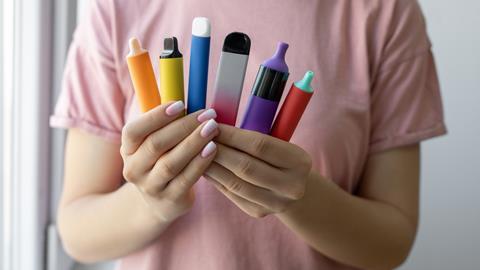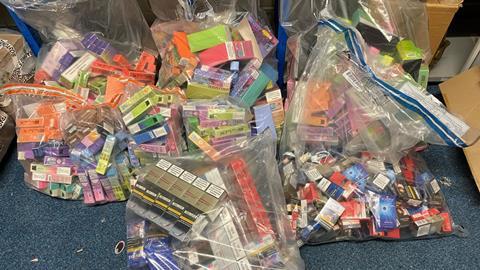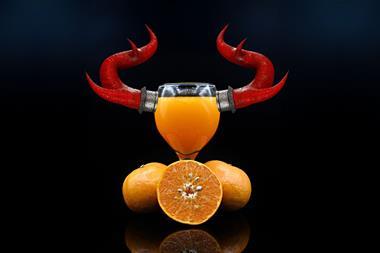The looming ban on disposables has made the £1.7bn category’s future unclear
Downloads
-
Focus On Vaping
PDF, Size 9.1 mb
Vape suppliers have been left with a sour taste in their mouths. It comes after the government announced last month it would ban the sale of disposable smoking devices – a move driven by “worrying trends” including a rise in youth vaping.
For the leading industry group, the UK Vaping Industry Association (UKVIA), the decision has all the flavour of “profound dismay and disappointment”.
The “draconian” measure, UKVIA argues, will result not only in job losses, but also “in the loss of lives” – as former and new smokers turn to tobacco products.
UKVIA has legitimate cause for concern. The new rules – likely to kick in from early 2025 – threaten to deal a fatal blow to an industry in phenomenal growth. Leading brand ElfBar is up 87.4% in value [NIQ 52 w/e 9 September 2023], while rival SKE Crystal Bar brand has earned £203m from a standing start to become Britain’s third-biggest vape. Such performances have helped the category more than double in value to £1.7bn. Volumes have doubled too – an additional 155.2 million units have gone through tills.
But other numbers suggest dark clouds may be forming. Disposables make up 88% of UK vape sales, according to Imperial Brands UK&I, owner of the Blu brand. A ban could therefore have cataclysmic consequences. A source at one major Chinese disposable brand believes it “really could be the death of us”.
“Vapes are a hazard in our bin lorries and difficult to deal with in recycling centres”
So, what effects are the government’s new policy likely to have on vaping? How prepared are suppliers? And what difficulties could be ahead for the category?
News of the ban comes after scandal plagued vaping through 2023. In February, it emerged ElfBar disposable vapes containing 50% more than the legal limit of liquid nicotine were being sold in major supermarkets. The controversy led to devices being pulled from shelves in Tesco, Sainsbury’s, Asda and Morrisons.
Lab tests in March of other disposable devices including SKE Crystal, Smok Mbar, IVG, Found Mary, Klik Klak, Solo and Solo+ also discovered nicotine juice volumes that far exceeded the legally permitted 2ml.
Brands pushed the boundaries in marketing, too. In May, ElfBar was rapped by the ASA for promoting its products via influencers on TikTok. As a result, the brand said it would cease all TikTok marketing in the UK. HQD, another China-based brand, was found in breach on similar grounds that same week.
Then there was the ongoing environmental problem of disposables. Research by Material Focus early last year found almost all vape device and vape juice suppliers in the UK were failing to comply with legal obligations to fund recycling. And according to a joint investigation by Material Focus and the Bureau of Investigative Journalism, more than 50% of single-use vapes get binned rather than recycled.
Single-use vapes “blight our streets”, says councillor David Fothergill, chairman of the Local Government Association’s Community Wellbeing Board. Used devices are “a hazard in our bin lorries and expensive and difficult to deal with in our recycling centres”.
- Vape volumes have more than doubled, continuing several years of incredible growth for the category.
- “Growth is driven by disposable brands,” says NIQ analyst Tymur Bezuhlyi. “Higher demand, new product launches and better availability fuelled growth for this sector.”
- SKE and Lost Mary have skyrocketed, becoming the third and second-biggest brands respectively. They’re worth a combined £523.6m, having shifted a total of 88.7 million packs.
- With a value of £585.7m in grocery, ElfBar is still number one. It added £273.1m in the past 12 months.
- Bezuhlyi attributes the rise of SKE to strong distribution growth in the impulse channel and the development of “unique flavour varieties”.
- Against overall strong category growth, some of the more traditional vape brands have suffered. Cirro, 10 Motives and Edge were the only category leaders to see volumes fall this year. As a result, they’ve shed £12.1m between them.
- 10 Motives, the sole top 10 brand that mimics the look and feel of a cigarette, has seen volumes slump by 30.5% – more than any other top 10 vape.
- “Brands in decline tend to be non-disposable and suffer from distribution losses,” says Bezuhlyi.

External threats
Such controversies only strengthen the case for the government’s hotly anticipated ban – which, now confirmed, has led the industry to speculate on its effects.
“The new regulations could mean a possible loss of sale and more red tape, along with an expectation to police new rules,” says Lindsay Mennell Keating, head of corporate & legal affairs at Imperial Brands UK&I. She considers the ban “illogical and counterproductive”.
Still, the financial impact on Imperial and the overall category will be relatively small. Its Blu brand, which comprises disposable and refillable vapes, is worth £51.2m in grocery. That’s just 3% of the market’s value and a drop in the ocean compared with Imperial’s sizable tobacco portfolio. Its top five cigarette brands alone are worth £3.7bn.
The ban will be felt much harder by suppliers with disposable vapes as their core proposition. And it could require some drastic rethinking from them.
“The new regulations could mean more red tape and an expectation to police new rules”
“Many brands will have to rethink their business model and look at changing the ways they market their products. We are likely to see an increase in popular vape brands releasing a broader range of pod versions,” says Markus Lindblad, head of external affairs at online nicotine product retailer Haypp. “As long as these popular brands keep adapting and constantly bringing out new products, there is no reason why they can’t still hold the leading positions within the industry,” he adds.
As long as they abide by other new rules, that is. As well as the ban on disposables, the government will restrict flavours “specifically marketed at children” and ensure manufacturers produce “plainer, less visually appealing” packaging.
And there will be a change in how vapes are displayed in shops, moving them out of sight of children and “away from products that appeal to them, like sweets”.
Lindblad believes this could mean “new, lesser-known brands will have a hard time creating awareness around their products”, with established brands “likely to take the lion’s share”.
“We are likely to see brands releasing a broader range of pod versions”
Many bigger names are already ahead of the regulations. Take Supreme-owned 88vape, which has scrapped bright colours and made flavour names more “age appropriate” since late 2023. ElfBar and SKE are also adopting more basic flavours.
It is unclear as yet how far flavour restrictions might go. But “the government must tread extremely carefully”, warns Lee Bryan, co-founder of Arcus Compliance, or many vapers could switch to cigarettes.
Black market
While the new rules will undoubtedly shake up the market, they also risk introducing a grave threat, some argue: an influx of illicit, unregulated vapes.
“This counterproductive legislation will put children at greater risk by turbocharging the black market,” the UKVIA warns.
Its fears are not unfounded, says vape retailer Evapo chief executive Andrej Kuttruf. He points to Australia’s legislative crackdown on vapes – which has resulted in a thriving illegal market and made little dent in youth use – as a cautionary tale. A UK ban, he believes, will “hand much of the regulated nicotine market to criminals on a silver platter”.
Legislators, however, aim to give greater powers to Trading Standards to issue on-the-spot fines to dodgy retailers, and a funding boost for border controls. This will prove critical. Without strict enforcement, the government’s plan could go up in smoke.
Downloads
Focus On Vaping
PDF, Size 9.1 mb


























No comments yet